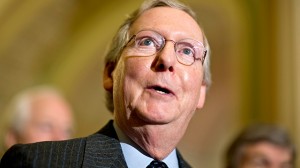
Sen. Mitch McConnell (R-KY) was the top recipient of funds from lobbyist-donors in the 2014 cycle, according to an Open Secrets report. (AP Photo/J. Scott Applewhite)
Sincere or strategic, lobbyists give big → When lobbyists dig into their wallets to make political donations, there are a number of beneficiaries – the politician (usually an incumbent), the organization that gains access to the legislative process and (as it turns out) the lobbyist him or herself. According to an in-depth analysis by Emily Kopp at Opensecrets.org, lobbyists rank 13th among all interest groups making contributions to the 2014 campaigns – up from 22nd at the end of 2012. Individual lobbyists contributed 22 times more than lobbying firms’ PACs. The sixth-ranking lobbyist-donor Ben Barnes, a pillar of Democratic politics in Texas, tells Kopp, “I think anyone could be sanctimonious and say they’re donating for the love of their country, but how you make a living has something to do with it.” In this cycle, Barnes himself has given out some $79,000. Read Kopp’s report for revealing statistics on lobbyist-donors and their top recipients.
Activist lawyer aims to drop campaign limits → If the Supreme Court strikes down the current restrictions on individual campaign contributions in its highly anticipated decision in McCutcheon v. FEC, it could prove the biggest blow to campaign-finance regulations since the 2010 Citizens United decision. While justices deliberate, Fredreka Schouten, reporting for USA Today, caught up with Dan Backer, the 36-year-old activist lawyer who convinced McCutcheon to bring the case. “The government shouldn’t be in the business of policing speech,” Backer told Schouten. Backer isn’t challenging the base limits on individual campaign contributions, but rather the aggregate cap – a cap that limits the total number of candidates to whom an individual can donate. Pushing the envelope isn’t new to Backer – at one point he tried to get the FEC to accept bitcoin donations to federal campaigns; and at another time he argued that sitting members of Congress should be allowed to run their own super PACs. Both efforts failed. The word on McCutcheon could come as soon as the week of March 24.
Why have FEC lawyers locked away a potentially crucial bit of evidence that campaigns could use to craft election strategy? → With three Democrat commissioners and three Republican commissioners, the Federal Election Commission is known for its paralysis. But Shane Goldmacher at the National Journal provides a mind-boggling and mysterious example of dysfunction in a very important case. Crossroads GPS, the 501(c)4 nonprofit affiliated with Karl Rove, spent $255 million from 2010 to 2012 to help fund and shape campaigns across the country. To maintain its status as a nonprofit and to be allowed to keep its donors secret, the activities of Crossroads GPS must be deemed, for the most part, non-political. In its review, the FEC’s general counsel concluded that Crossroads should have registered as a political committee. All that was left to button down the case was publishing the partisan statements and the counsel’s findings. It’s a process, writes Goldmacher, that provides a roadmap for attorneys and political strategists who want to know “just how far their clients could stretch the legal limits of election law without earning an FEC rebuke.” But one controversial footnote has brought that process to a halt. The Republicans attached a document to that footnote that they said informed their decision — but each of its 76 pages was redacted. No one at the FEC is saying why. So much for clarity and transparency.
Microsoft is using your data to target political ads on Xbox Live → As we near the midterm elections, you might turn to your Xbox Live to avoid the political ad storm on your television. But there may be no escape. Your headache is Microsoft’s opportunity, according to Brian Fung of The Washington Post. Microsoft is trying to persuade politicians to buy ads on Xbox Live, Skype, MSN and other Microsoft platforms. Microsoft can then profile its customers through user IDs and other public data to offer election campaigns the ability to target demographics and voting districts.
Michigan race highlights tea party versus establishment struggle → The widening rift between establishment Republicans and the tea party has become a major theme of the 2014 midterms. Susan Cornwell of Reuters is keeping her eye on the Republican primary for Gerald Ford’s old congressional seat in Michigan. The mainstream Republicans who voted for Justin Amash four years ago are tired of his uncompromising tea party antics. Instead, they are backing his challenger, Brian Ellis, a Republican who promises collaboration and calls himself “West Michigan Nice.” But the big outside money is on Amash – the Koch brothers’ Americans for Prosperity and the Club for Growth are doing their best to keep him in his seat.
More on the divided Right:
– Leading Republicans move to stamp out challenges from Right By Carl Hulse, The New York Times
– Big business takes on tea party, gently By Anna Palmer, Politico
In case you missed it, more money links:
– Research: Money does buy access to lawmakers By Joshua Holland, BillMoyers.com
– It’s official: One Koch brother equals 515,000 union members By Jonathan Cohn, The New Republic
– Wanted by Ecuador, two brothers make mark in US campaigns By Frances Robles, The New York Times
– What the Dem attacks on the Koch brothers are really about By Greg Sargent, The Washington Post
– Meet the newest member of the super PAC billionaires club: Tom Steyer is taking his climate politics national in 2014. But will it play outside California? By Scott Bland, National Journal
– Expanding the Senate map promises to get expensive By Kyle Trygstad, Roll Call
– Comcast spreads cash wide on Capitol Hill By Tony Romm, Politico


